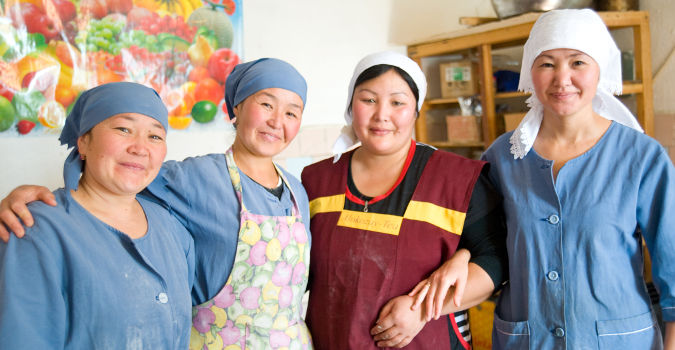Economic empowerment

In Kyrgyzstan, UN Women aims to accelerate rural women's economic empowerment. Women are central to the development of rural areas and to national economies. They account for a significant proportion of agricultural labour, play a key role in food production, especially in subsistence farming, and perform most of the unpaid care work in rural areas.
Unpaid care makes it difficult for rural women in Kyrgyzstan to take advantage of on- and off-farm employment opportunities. Rural women and girls often face restricted access to productive resources, such as land, agricultural inputs, finance and credit, extension services, and technology. This limits the agricultural sector’s efficiency. Traditional and cultural norms make it more difficult for women to gain access to public services, markets and institutions, social protection and decent employment opportunities.
The challenges facing rural women are amplified by the combined impact of the recent economic crisis, volatile food and fuel prices, climate change, a lack of investment in rural development and agriculture and demographic changes.
To change this, UN Women in Kyrgyzstan supports policies and initiatives that:
- improve rural women’s food security and nutrition
- build the productivity of women smallholder farmers
- improve rural women’s access to assets, resources and services
- expand their income opportunities and access to high-value product markets
- ensure rural women’s participation and leadership in shaping responses to challenges.
UN Women in action in Kyrgyzstan
In October 2012, UN Women, FAO, IFAD, and WFP launched the Acceleration of Rural Women’s Economic Empowerment (ARWEE) programme in the Kyrgyz Republic. Part of a five-year global joint initiative, the Programme aims to:
- increase income opportunities and food security for rural women
- enhance rural women’s leadership and participation in local and national decision-making
- create a more gender-responsive policy environment in Kyrgyzstan.
As an example of our work, and as a result of social mobilization and a series of trainings on group solidarity, gender and development, business planning, and value chain development provided by UN Women, FAO and WFP within this programme, 231 representatives of rural poor populations, including 212 women in seven pilot communities, now have improved agricultural activity. They were able to produce a total of 576 tons of vegetables worth approximately USD 188,700. This has contributed to increased food security, better family nutrition, and more economic livelihood.
The Programme will use FAO’s policy assistance on agriculture and food security, value chain training and normative work; WFP’s food assistance innovations; and UN Women’s technical expertise on women’s economic empowerment and its mandate to promote accountability for gender equality and women’s empowerment.